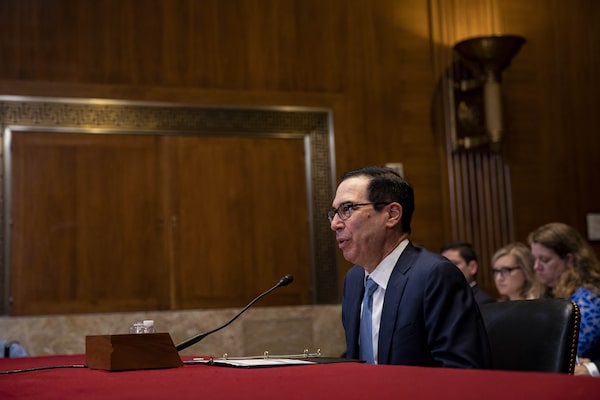
U.S. Secretary of Treasury Steve Mnuchin testifies at a Financial Services and General Government Subcommittee hearing on May 15, 2019 in Washington.Anna Moneymaker/Getty Images
U.S. Treasury Secretary Steven Mnuchin said on Wednesday he will likely travel to China soon to continue talks as Washington and Beijing seek to resolve a trade war that has cast a pall over the global economy and financial markets.
Mnuchin did not elaborate on the timing of future negotiations but characterized two days of high-level talks with Chinese officials in Washington last week as constructive.
“My expectation is that we will go to Beijing at some point in the near future to continue those discussions,” he said in a U.S. Senate Appropriations subcommittee hearing. “We’re continuing discussions. There’s still a lot of work to do.”
Mnuchin’s remarks dovetailed with a cooling of the Trump administration’s rhetoric towards China after another round of tit-for-tat tariffs between the world’s two largest economies and a selloff on global stock markets.
On Tuesday, U.S. President Donald Trump denied the talks with China had collapsed and sounded an optimistic note about the chance of a deal to end the trade war, saying he had an “extraordinary” relationship with Chinese President Xi Jinping.
Trump, who plans to meet Xi at a G20 summit in Japan next month, also urged China to buy more U.S. farm products.
U.S. agricultural goods, including soybeans, have been targeted by China’s retaliatory tariffs, and American farmers, a key political constituency for Trump, are frustrated with the failure of the two sides to find a solution to the dispute.
The U.S. Department of Agriculture has paid out $8.52 billion (£6.63 billion) directly to farmers as part of a 2018 aid programme designed to offset losses from trade tariffs by China and other trading partners, a spokesman for the agency said on Wednesday.
The Trump administration had pledged up to $12 billion in aid to help offset losses for crops hit by Chinese tariffs.
TARIFF PAIN
Amid complaints from trading partners in Europe and North America, who see the United States as having embraced a “carrot-and-stick” strategy that has been thin on carrots, the Trump administration may be signalling a softer approach.
In the hearing on Wednesday, Mnuchin said the United States is close to resolving a dispute over steel and aluminium tariffs that were imposed on Canada and Mexico last year as the three countries renegotiated the North American Free Trade Agreement.
U.S. Trade Representative Robert Lighthizer met with Canadian Foreign Minister Chrystia Freeland in Washington on Wednesday to discuss those tariffs, which have aggravated Ottawa and Mexico City, and other issues related to the U.S.-Mexico Canada Agreement (USMCA), the replacement for NAFTA.
The three countries have not yet ratified the new deal.
Freeland told reporters she had discussed the “Section 232” tariffs on Canada with Lighthizer but declined to say whether the two countries were close to a deal.
“We made the case as we have been doing for some time that the best outcome for both Canadians and Americans would be to lift those tariffs and to have free trade between our two countries who have this fantastic trading relationship in place,” Freeland said.
U.S. House of Representatives Speaker Nancy Pelosi said she had a “productive meeting” with Lighthizer that was almost entirely focused on the USMCA deal, one of her aides said.
Trump also is expected to delay a decision on slapping tariffs on imported cars and parts by up to six months, three U.S. administration officials told Reuters. A formal announcement is expected by Saturday, the officials added.
The tariffs of up to 25 percent on cars and parts could have a devastating impact on Japan and countries in the European Union, particularly Germany.
Global stock markets, which have swooned in the past week on the back of rising trade tensions, were trading mostly higher, with major U.S. indexes adding to gains from Tuesday.
’ADVERSE CONSEQUENCES’
Trump, who has embraced protectionism as part of an “America First” agenda and railed against what he describes as China’s unfair trade practices, has not ruled out imposing punitive levies on all of China’s imports to the United States.
As negotiations towards resolving the U.S.-China trade war stalled last week, the United States raised the pressure by increasing tariffs to 25 per cent from 10 per cent on a previous, $200 billion list of Chinese imports.
China retaliated on Monday with higher tariffs on a revised list of $60 billion worth of U.S. products
Trump could launch 25 per cent tariffs on another $300 billion worth of Chinese goods when he meets Xi next month.
China is vowing not to succumb to such pressure.
A further escalation of the trade war could disrupt global supply lines and damage a slowing world economy.
China on Wednesday reported surprisingly weaker growth in its retail sales and industrial output in April.
Data out of the United States showed U.S. retail sales fell last month as households cut back on purchases of motor vehicles and other goods, pointing to a slowdown in economic growth after a boost from exports and inventories in the first quarter. Other data showed a drop in U.S. industrial production in April.
There is unease in the U.S. Congress about the potential fallout of tariffs on the broader American economy.
U.S. House Majority Leader Steny Hoyer said U.S. consumers were in the “same boat as farmers” and would end up having to bear the burden of the tariffs. Consumer spending accounts for more than two-thirds of U.S. economic activity.
“What we ought to do is have a rational trade policy that doesn’t have adverse consequences (rather) than have to fill the hole economically through additional payments,” Hoyer, the No. 2 Democrat in the House, told reporters.